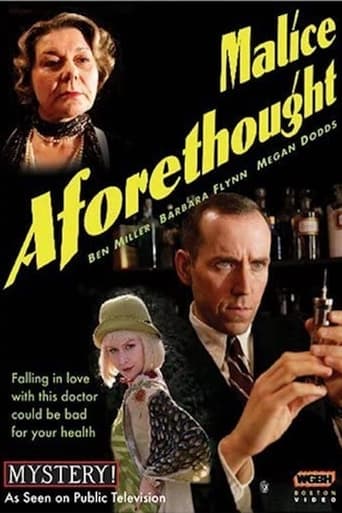

Several reviewers have asked why Bickleigh married his wife in the first place. I haven't read the book, or been able to view this 2005 remake, but I've seen the 1979 version a couple of times and was amused by the plot and impressed with the acting. In the 1979 version, Mrs. Bickleigh - a delightfully authoritarian Judy Parfitt - states that they didn't love each other when they married, but she needed to "get away from a situation at home." The book by Francis Iles (one of Anthony Berkeley Cox's nommes de plume) is available for a few dollars from eBay, and that probably has more background on Mrs. B's problem at home before marrying the slick doctor.In 1979, Madeleine was superbly played by the always-wonderful Cheryl Campbell. Please catch that version if you can, it's in four 50-minute installments, without feeling like three and a half hours. Denny is not an alcoholic in that one, and there wasn't a hint of any French or other nationality creditors pursuing Madeleine.
... View MoreFrom 2005, "Malice Aforethought" is another adaptation of the 1931 book by Anthony Berkeley, this one starring Ben Miller, Barbara Flynn, Lucy Brown, and Megan Dodds.The story takes place in an English village between the wars and concerns one Dr. Edmund Bickleigh, married to an older woman, Julia (Barbara Flynn), who is an upper class, domineering snob. Edmund busies himself with doctoring, his art work, and an affair with Ivy (Lucy Brown), which the whole town seems to know about. When the flashy Madeleine (Megan Dobbs) moves into town, he becomes very interested in her. Anxious to marry her, he kills Julia over time by giving her a drug withdrawn from the market because it causes severe headaches, and helping the headaches with larger and larger amounts of morphine. When she dies, it's assumed from the injection sites that she was a morphine addict.Things don't work out for dear Edmund as he planned, however. Madeleine, it turns out, despite the fancy house, is broke and needs to marry someone with money, which she does. Ivy marries William Chatford (Richard Armitage) and confesses her affair with Edmund to him. He therefore hates Edmund and has an axe to grind against him. Before long, suspicion has fallen on Edmund, and he is forced to take desperate measures.Excellent story, and though I haven't read the book or seen the 1979 version, I liked it. I loved the production values, and Ben Miller made an attractive Edmund who tries to keep his cool in the face of some difficult questions.Hywel Bennett played the role in 1979 and he has been described as "darker" - I'm sure his portrayal worked beautifully in that production. Here, I liked the fact that Miller didn't seem particularly menacing. Often narcissists or people out for themselves take the need to murder as a matter of course and feel it's a necessity, and that's how Miller played the role.The rest of the cast was very good, and the ironic ending will be a cause for discussion if you're not aware of what happens.I get the feeling this version was given a lighter touch than previously. Because the story is so good, I think it works fine. Supposedly it differs from the book in some key spots, including the doctor's relationship with his wife. Enjoy.
... View MoreExcellent! And 25 or so years later after the BBC version this production is indeed excellent, but my thoughts do go back to the BBC version with Hywel Bennett back in 1979 with Judy Parfitt playing his overdosed wife which was so very dark. Bennett at the time had the looks to play any lead character, but the darkness of Bickleigh he portrayed with true style and strength. Ben Miller's excellent as ever, met him once as is Barbara Flynn who's consistently one of our best actresses and voice over artists in the UK, this is a great revival but I'd love to see the 1979 BBC version as well... Just think Bennett's portrayal was darker... At the time he was the man of the moment coming off the back of Dennis Potter's 'Pennies From Heaven' Peter Tilbury's excellent 'Shelly' and then in Le Carre's 'Tinker Tailor Soldier Spy' as Ricki Tarr. He was the actor of that time. Please BBC release the 1979 version.John, Manchester UK
... View MoreI had the great pleasure of watching installment one of this film on PBS last night. All I can say is "wow." The Brits have, done it again! Amazing setting, great costuming and Ben Miller as Dr. Edmund Bickleigh is amazing.I am an independent director and am preparing a short film for the State of Virginia set in the Revolutionary War and if we weren't so short for time (and sadly, budget, I'm sure Ben would cost a packet) I would SCRAMBLE to get him to play SOME part in this film! He has an intensity that I have not seen recently and his character is entirely believable.The rest of the cast is just as impressive: Barbar Flynn, Lucy Brown, all of them absolutely amazing.If you haven't yet seen this film and have the opportunity to do so, I could not recommend it more enthusiastically.Semper Fidelis, Sean Annapolis, MD
... View More